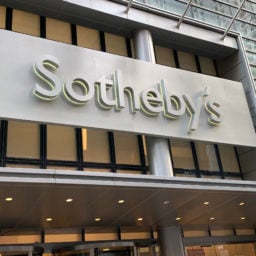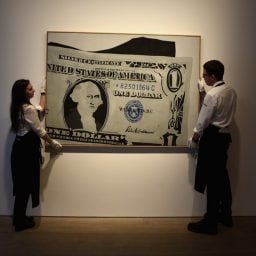Christie’s auction house has agreed to pay $16.7 million to the Manhattan District Attorney for failing to properly collect New York sales tax between 2013 and 2017. The bombshell settlement, which follows a lengthy investigation into the company, was announced by the DA’s office today.
As part of the settlement, Christie’s will pay a lump sum of $10 million, followed by an additional $6.7 million, in sales tax, penalties, and interest to the DA’s Office. The funds—based on taxable sales made between 2013 and 2017 that totaled $189 million—will be provided to New York State. In a statement, the DA’s Office said that Christie’s “admitted to failing to register to collect and to collect New York and local sales tax” on certain purchases made in or delivered to New York “despite having a legal obligation to do so.”
The violations took place in two divisions, according to documents released by the DA: Christie’s offices overseas and its private sales department. First, Christie’s failed to collect sales tax on eligible works sold by foreign offices but delivered to customers in New York between at least July 2013 and January 2017.
Second, back in 2013, Christie’s sought to centralize its international private sales operations in a division out of London—and was advised incorrectly by a lawyer that, as a result, it did not need to collect New York tax on sales to New York clients.
According to the DA, even Christie’s own specialists eventually began to ask why they were not required to collect New York tax on private sales—especially when some of the private sales took place in pop-up galleries in New York. But the auction house’s legal team did not realize its error until 2015, when it sought separate advice on another new initiative.
To make matters worse, according to internal documents, when Christie’s tax officials realized their mistake, they sought to cover their tracks: the auction house’s tax manager misrepresented Christie’s private sales as sales from Christie’s New York in an effort to avoid arousing suspicion about its past error and getting audited. The tax manager and their supervisor are no longer working at the company as of 2017, when the DA’s investigation began, according to documents provided to Artnet News.
A spokesperson for Christie’s told Artnet News that the issue was the result of bad advice. “For the past several years, Christie’s has worked in cooperation with the Manhattan District Attorney’s Office to resolve specific issues created as a result of incorrect tax advice Christie’s received regarding the application of sales tax obligations for specific non-US affiliates,” the spokesperson said. “The company has since reviewed its advice and internal processes to ensure compliance with relevant tax law. This settlement agreement brings the matter to full resolution.”
Further, “financial provisions for the initial settlement payment were accrued in previous years,” the Christie’s spokesperson told Artnet News. And the auction house’s leaders have “voluntarily worked with the Manhattan District Attorney’s Office over several years to fully investigate and resolve the matter.”
In a statement, Vance thanked prosectors for “completing this meticulous investigation under the extraordinary circumstances of the COVID-19 public health emergency” and “delivering millions of dollars in badly-needed revenue to the people of New York.” He added: “Aggressive, proactive, white-collar investigations like this one… have put multinational companies across the world on notice that the privilege of doing business in Manhattan comes with the obligation to comply with our tax, business, and criminal laws.”
According to the DA, the agreement takes into consideration Christie’s cooperation with the investigation and its adoption of new measures to comply more carefully with New York tax law in the future.









